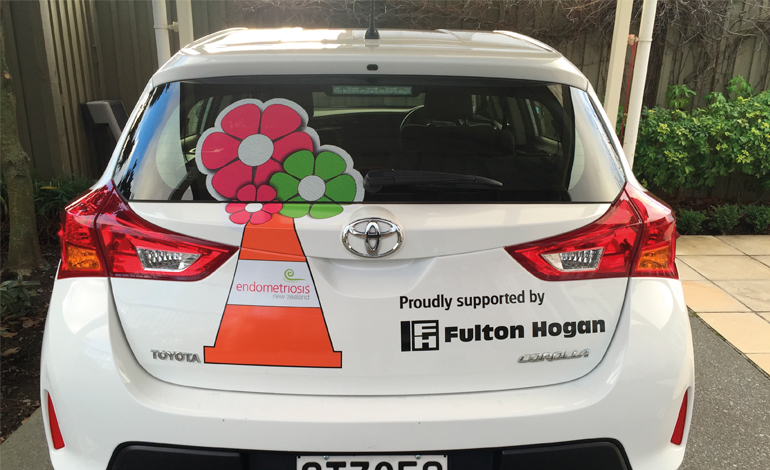An unlikely relationship was cemented earlier last year when Fulton Hogan, a large company with 80 percent of its 3500 Kiwi staff men, became a sponsor of Endometriosis NZ – a small charity devoted to tackling a painful women’s health issue. By MARY SEARLE BELL.
SO WHAT DO endometriosis and civil construction have in common?
Not a lot on the face of it. One is a cruel medical condition, affecting thousands of New Zealand women, the other is about building roads, ports, airports, and infrastructure. Regardless, a recent partnership between Fulton Hogan and Endometriosis New Zealand has been forged – a surprising but very happy pairing.
Endometriosis is a condition where tissue similar to the lining of the uterus is found outside the uterus – in places like the pelvic lining, ovaries, and bowel – where it shouldn’t be. It can cause pain with periods, bowel problems, painful sex, tiredness and low energy, and fertility issues, amongst other problems. It affects around one in 10 girls and women, with many more undiagnosed, and Endometriosis NZ says at least 120,000 Kiwi girls and women have the condition.
Obviously, the physical condition is very much a women’s problem, however, in reality, it impacts more than just women, Endometriosis NZ CEO Deborah Bush explains to Contractor.
“It affects lots and lots of men – not in a physical sense, but as husbands, partners, fathers, sons, employers and taxpayers,” she says.
Some 27 percent of school girls between the ages of 13 and 18 are taking time off because of distressing period symptoms, she adds, and while endometriosis often starts young (from a girl’s first period) it still takes over eight years to get a diagnosis from first presenting with the problem.
In the workforce 11 hours per woman per week are lost to absenteeism because of endometriosis. For couples, a third of women in fertility clinics are there because of endometriosis.
The cost of this disease to the taxpayer is $1.2 billion per year in surgical and medical expenses. So clearly, it’s not just a women’s problem.
Deborah says one of her roles at Endometriosis NZ is to raise public awareness and perception of the condition and to bring about change. Endometriosis NZ’s services are largely in education but it is also working with government to bring about legislative change.
“I thought it would be helpful to have a large construction company to support us.”
So she approached Fulton Hogan, one of the biggest construction companies in the country, and its board was interested right away.
They could see it was bigger than just a female problem and that a whole community approach is needed to address the effects of endometriosis. A check of the company’s own medical claims showed endometriosis was a prevalent issue amongst staff.
Fulton Hogan CEO Robert Jones says they identified strong synergies between the two organisations, including mutual values and a common commitment to making a difference: “Like Fulton Hogan, Endometriosis NZ is a pioneer in its field, recognised in its own right as an industry leader, providing services, support, and connecting its community.”
He says the company is on a diversity journey – it has a programme called ‘Road to Success’ to focus on minority groups in their business, such as women, Maori, Pacific Islanders and Asians, and to develop them to leadership roles. They’re beginning with women, and so the relationship with Endometriosis NZ ties in nicely with that.
“Going forward, the industry is busy and there’s a resource shortage,” says Robert.
“We are working hard to attract women into the industry, and our relationship with Endometriosis NZ shows we are serious about addressing issues for women in business.”
He says the company already offers flexibility of working hours and is amenable to family responsibilities.
Since the relationship was launched in April 2016, Robert says a number of men on his staff have told him that their wife or partner suffers from endometriosis and it has had a negative impact on their lives. He says they are grateful Fulton Hogan has got involved to tackle the problem.
“Guys you wouldn’t ever imagine talking about things like this have spoken to me about it. It’s been a real eye opener.”
Deborah says the social stigmas around endometriosis, period pain and dyspareunia (painful intercourse), are one of the last remaining taboos of modern medicine. One of the jobs of Endometriosis NZ is to break down these barriers.
“Fulton Hogan wants to remove barriers for women who want to work in engineering or roading, it’s a very family-oriented company that cares about communities and the people in them. Endometriosis deeply affects relationships and families.”
Deborah describes the relationship between the two companies as warm, friendly and supportive. She says the Fulton Hogan board have always been comfortable meeting uncomfortable topics, and do so with empathy.
“It’s been nothing but a wonderful, positive experience,” she says.
The money provided by Fulton Hogan will help Endometriosis NZ deliver world-leading education on the topic – funding the ‘me’ (Menstrual Health and Endometriosis) programme in secondary schools, it will also fund Endometriosis NZ to work collaboratively in a research project with the University of Adelaide and University of Melbourne.
Robert says the relationship is also creating opportunities for joint events to help raise the profile of the condition. Endometriosis NZ has held talks with Fulton Hogan staff and Fulton Hogan staff have been involved in Endometriosis NZ events.
“It’s a new relationship – we’re working through how to make it better,” he says. “Over time we will see it develop and mature, but we’re just starting.”

